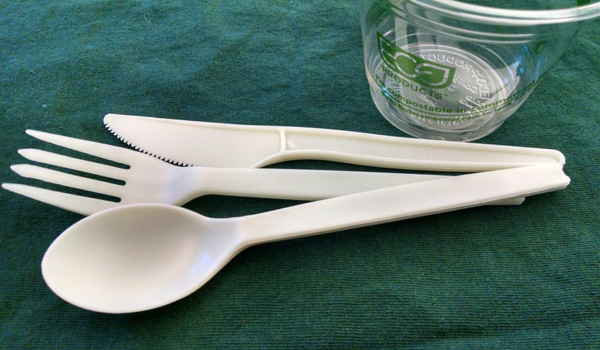When it comes to disposable plastic utensils, quit forking around. Seriously, cut it out if you’re buying something described as “disposable” and with the intention of recycling it.
But let’s assume for a minute that you have plastic utensils from take-out restaurants, office lunch parties or numerous other scenarios and want to keep them out of landfills. In theory, these utensils should be recyclable, but here are three challenges that may prevent your local program from accepting them.
1. Inconsistent Material
In a perfect world, all plastic utensils would be made from the same plastic resin, but that’s simply not the case. The majority are made of polystyrene (#6 plastic), a plastic most commonly recognized in its expanded form as Styrofoam. Some cities are so concerned that consumers will put expanded polystyrene in the recycling bin that they don’t accept #6 plastic in any form.
Other plastic utensils are made of PET (#1 plastic) or polypropylene (#5 plastic), which have a larger recycling market than polystyrene. Unfortunately, individual utensils won’t be labelled, so you’ll have no way of knowing which plastic resin you have unless you can refer to the original box (meaning you bought disposable utensils in the first place). Unless your curbside program says it accepts all plastics, it’s best to leave them out.
2. Unorthodox Shape
Materials recovery facilities (MRFs) are designed to take everything from your blue bin and sort it by material, then bale and send it off to a recycling company. Baling is much easier for materials that collapse, like aluminum cans, plastic bottles and newspaper.
Plastic forks and knives can jam machinery in the MRF and are often considered a top source of contamination.
3. The China Conundrum
When accepted for recycling, plastic utensils are classified as rigid plastics, just like clamshell packaging, blister packs and yogurt containers. In the U.S., our solution for rigid plastic recycling has been to export it to China, while plastic bottles and bags are usually recycled domestically.
However, China is cracking down on the import of plastics, which could soon affect all rigid plastic recycling in the United States. If domestic recycling markets don’t emerge, even cities currently accepting utensils for recycling will stop accepting them.
Whether or not you can recycle plastic utensils will depend on your city, and there are lots of factors that limit the recycling market. If you’re buying plant-based cutlery thinking it can be composted, the jury is still out on whether these products actually break down even under the highest temperatures. Your best bet: Stick to reusable utensils.
Editor’s Note: The original version of this article suggested that the Foodservice Packaging Institute lobbied the Institute of Scrap Recycling Industries to include utensils as accepted materials in recycling programs, with objection from recyclers. FPI presented to ISRI but did not lobby for the meeting, and utensils were not included in the discussion.
Source : earth911.com









